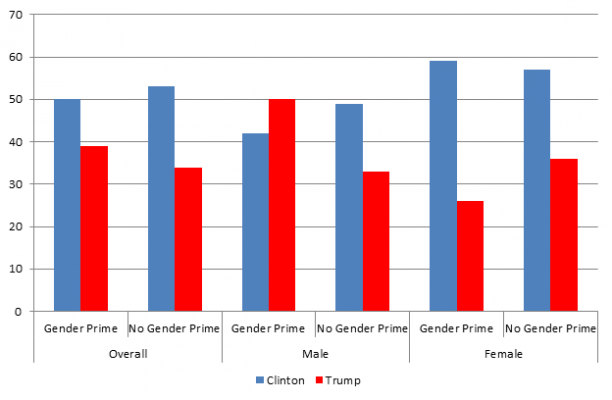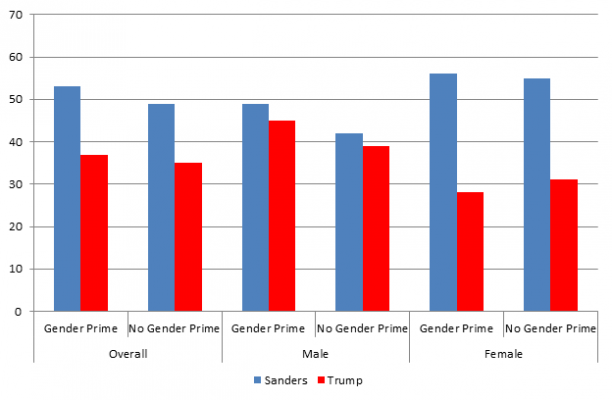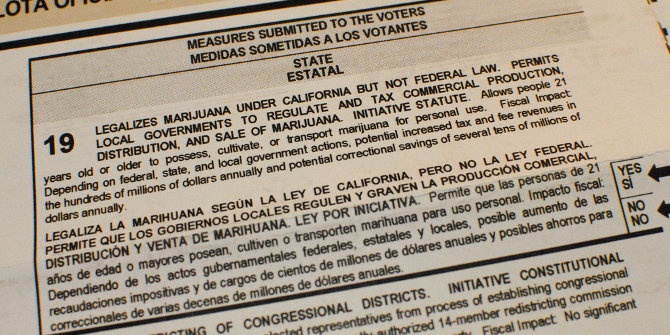 There has been little discussion of the impact of Hillary Clinton’s gender on her electoral prospects, but are American men really ready for a female President? Looking at the results of a new experiment, Dan Cassino finds that the threat to male identity embodied by Clinton is costing her as much as 24 points among men, and bringing her down by 8 points overall.
There has been little discussion of the impact of Hillary Clinton’s gender on her electoral prospects, but are American men really ready for a female President? Looking at the results of a new experiment, Dan Cassino finds that the threat to male identity embodied by Clinton is costing her as much as 24 points among men, and bringing her down by 8 points overall.
While most of the attention in the 2016 Presidential primary has been focused on the Republican race, there’s one strange finding on the Democratic side that bears exploring: self-identified socialist Bernie Sanders typically does better in national head-to-head match-ups than frontrunner Hillary Clinton. A new study shows why: many Americans just aren’t ready for a woman President.
One of the main reasons Clinton’s numbers are lower than they would be otherwise is gender role threat, which is costing her as much as 24 points among men in the likely match-up with likely Republican nominee Donald Trump in November. Volumes of research in sociology have shown how men respond to perceived threats to their masculinity: in the face of personal or societal threats to their masculine identity, some men become more likely to endorse anti-gay stances, pro-gun policies, or anti-abortion views.
For instance, men who feel that their gender role is threatened by a wife who earns more money than they do may become more likely to embrace religious justifications for male superiority, or play up their role as the protector of the household. In this case, gender role threat is leading to increased support for Donald Trump, and decreased support for Clinton among men.
In the study, a randomized experiment was embedded in an otherwise normal political survey of likely voters in New Jersey. Half of the respondents were asked about the distribution of income in their own households – whether they or their spouse earned more money – before being asked about their preference in the Presidential general election. The other half were only asked about the distribution of income in their household at the end of the survey. This question was designed to remind people of disruption to traditional gender roles, without explicitly mentioning Clinton or a female president, and simulate the sorts of subtle gender-based attacks that can be expected when Clinton is a general election candidate.
The effects of the gender role threat question are enormous. As Figure 1 shows, men who weren’t asked about spousal income until after being asked about the Presidential election preferred Clinton over Trump, 49 to 33. However, those who were reminded about the threat to gender roles embodied by Clinton preferred Trump over Clinton, 50 to 42. Concerns about gender role threat shifted men from preferring Clinton by 16 to preferring Trump by 8, a 24 point shift.
Figure 1 – Effects of concerns over gender role threat on support for Donald Trump and Hillary Clinton

The case that this is really about Clinton’s gender, rather than her party is made clearer by the fact that the same experiment has almost no effect on support for Sanders in the match-up with Trump. As Figure 2 shows, men who weren’t asked about spousal income preferred Sanders over Trump by 3 points; those who were preferred Sanders over Trump by 4 points.
Of course, these effects don’t apply to all men. Past work on these issues has shown that gender role threat tends to polarize men, making liberal men hold more liberal views, and conservative men hold more conservative views on gendered issues. For instance, liberal men who earn less than their wives become more likely embrace their role as fathers and caregivers, and become more supportive of abortion rights and pay equity. So, the prospect of a female president may increase support for Clinton among a subset of liberal men, even if the overall effect on men is likely to be very negative.
The upside for Clinton is that the same gender role threat that costs her so much among men helps her – a bit – among women. Women who answered the Presidential questions first preferred Clinton by 21 points; those who were asked about spousal income first preferred Clinton by 33 points. That gain among women helps to offset the losses among men, but doesn’t come close to fully cancelling it out. In total, concerns about gender role cut Clinton’s lead over Trump from 19 points – 53 to 34 – down to 11 points, 50 to 39, without having any impact on Sanders’ margin over Trump.
Figure 2 – Effects of concerns over gender role threat on support for Donald Trump and Bernie Sanders

So, Sanders’ advantage over Clinton in the general election polls doesn’t necessarily have anything to do with his appeal to young people, or his policies: his advantage can be explained entirely by the fact that he’s a man. While gender hasn’t been an explicit issue in the Clinton campaign yet, it is already having a substantial effect, as American men aren’t nearly as ready for a female president as most observers seem to think they are.
Featured image credit: Gage Skidmore (Flickr, CC-SA-2.0)
Please read our comments policy before commenting.
Note: This article gives the views of the author, and not the position of USAPP – American Politics and Policy, nor the London School of Economics.
Shortened URL for this post: http://bit.ly/1VIilPx
_________________________________
 Dan Cassino – Fairleigh Dickinson University
Dan Cassino – Fairleigh Dickinson University
Dan Cassino is an associate professor of Political Science at Fairleigh Dickinson University in Madison, New Jersey, who studies political psychology and polling. His most recent book, “Fox News and American Politics,” will be released in April.







Cruz and Trump have naively disqualified themselves for ever being considered for President, falling for the exact purpose of terrorism, ” Over Reaction”, its central purpose. Hillary the grown up vs the total ignorance and naivete of the carpet bombing,torture, and Muslim neighborhood watch declarations by the Republican front runners which in themselves are totally Presidential consideration disqualifying statements. All this Republican ignorance is either unconstitutional, unlawful, war crimes, unenforceable to command, and too incredibly naive for any candidate to even be considered a responsible adult let alone Commander and Chief of the greatest nation on earth. But the one thing that is unquestionably confirmed, the inmates have taken control of the Republican asylum. Absolute proof the Republican party has become the refuge of the nations most ignorant and naive, intolerant, and as Kasich said, “just bat sh** crazy.” Thank god neither Trump nor Cruz will ever be elected President. Republicans have proven themselves unqualified to run a grade school class government.
American politics was invented for the first time this morning, and it shows that Trump could beat Clinton among a sub-group of New Jersey men more likely to resent women by 8 points.
On a totally unrelated point, in New Jersey in 2012 Obama trounced Romney among women by 24 points, 62-38, but the takeaway from this story is that Reump has an outside shot of winning New Jersey men by eight points.
Nationally, Romney defeated Obama among ALL men by 7 points. Obama won women by 12 points, for a 52-48 popular vote edge, and 332 electoral votes. Women cast 53% of the national vote; men 47%.
Thanks for sharing this post, this research is really important and it’s great that someone is doing it! I agree that this issue is extremely concerning; I am a bit curious about the results, however. (Full disclosure: as a white male, I might be being affected by some unconscious biases here, although as someone who voted for Clinton in my primary I think I’m giving this a fair hearing.) Long story short, the effect size is enormous and, to be blunt, seems maybe even too big to be plausible, from a statistical standpoint. For instance, in these sorts data, effect sizes that robustly replicate tend to be around 2-8 percentage points (per e.g. Gelman & Carlin 2014, http://www.stat.columbia.edu/~gelman/research/published/retropower_final.pdf), so finding such a huge effect here (as much as I am, as a feminist, inclined to believe it, based on my own experiences seeing the discourse around Clinton) seems like a potential (but not certain) red flag. I don’t see a link to the study, so I’m not sure about these details, but for example: how large was the sample? Was the study pre-registered? Was this specific comparison the one where a gender-related difference was expected to appear? What other manipulations were present in the survey?
Steve, you can find cross tabs and full details here: http://view2.fdu.edu/publicmind/2016/160323/
The study was not pre-registered- though that’s something that we political scientists should be doing more of. To be honest, the size of the effect was surprising to us, as well: we delayed releasing for a few weeks to do randomness testing and other statistical evaluations of the results. I should note that we’ve found similar- though slightly smaller- results with primes of identity, rather than identity threat, which made the results more plausible to us.
As for Gelman, et al, the survey size was large enough that I’m not worried about their concerns: if we were looking at less than a few hundred n in a lab experiment, it’d be a worry, but this was embedded in a representative statewide poll. We didn’t have any other experiments running in it, and this was the initial research plan- no back up DVs here.
In addition, the cross tabs all work out the way we’d expect: polarization effects by ideology and gender. That said, we are running a replication next month in a national sample, and will be releasing the results once we’ve done so.
Thanks for the details! Very interesting, I’ll keep an eye out!
Is the data available? And/Or a pre-print of Prof. Cassino’s paper that this blogpost is based on? Any links would be appreciated!
I found the data and methodology here:
http://view2.fdu.edu/publicmind/2016/160323/
Another commenter found some info here: http://view2.fdu.edu/publicmind/2016/160323/ I haven’t had a chance yet to look through carefully and see how complete it is.
The paper is in production- this and the replication will be presented at AAPOR this year. I’ll post a link to the completed paper once it’s done.
Not too impressed by the study design or the reporting here, which has no indication of standard error, sample size, etc. Also the cross-tabulations do not indicate party ID or party registration by condition. In short, it looks like you have a small and underpowered sample and found a slight difference which may or may not be attributable to the experimental condition. Most people vote based on party identification and have fairly firm attitudes toward the candidates. I suspect this is just a statistical artifact.
A framing effect.
“One of the main reasons Clinton’s numbers are lower than they would be otherwise is gender role threat, which is costing her as much as 24 points among men in the likely match-up with likely Republican nominee Donald Trump in November.”
The 24 points is not how much Clinton’s gender is costing her, it is the effect of the order of your questions. I am surprised you made such an imprecise statement.
Your statement only makes sense if you assume that “No Gender Prime” equals genderless candidates and “Gender Prime” reflects the results in polls and elections. Obviously, that’s wrong: no one gets asked whether “your spouse earns more than you” before they vote.
Of course the statement is very catchy and convenient for newspapers but I hope you will find a more accurate formulation in the final study.
By the way: why do you think this is related to Clinton’s gender? It may well be, but Clinton and Sanders differ in more than just gender. Their kind of feminism and political views are different. How can you be sure this isn’t the reason?